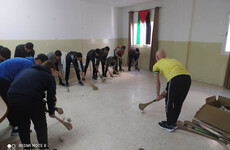WHENEVER RUGBY GETS back up and running, one of the issues that’s set to be addressed is the length of time scrums are taking.
Drawn-out scrummaging sequences have increasingly become a frustration for many in the game in recent years, to the extent that World Rugby discussed the topic at its player welfare and laws symposium in Paris earlier this month.
The most striking recent example came in Scotland’s win over France in the Six Nations two weekends ago.
In the first half alone, eight minutes and 39 seconds of play were taken up by six scrums or sequences of scrums.
The vast majority of that time involved the two forwards packs simply setting up to scrum, rather than actually scrummaging, meaning there were understandable frustration for many of those in the stadium and watching at home.
There was a very noticeable lack of energy from the crowd in Murrayfield during much of the first half and that was, in part, down to the slow pace of the scrums.
Before going any further, it’s worth pointing out that the scrum is a fantastic part of rugby. Having as many genuine contests as possible is central to the sport and the scrum perfectly encapsulates that value.
The tactical, athletic, and technical battle at scrum time can be enthralling and decisive in games, while the collective focus required to excel in this area is welcome in the sport.
Scrums are also excellent attacking platforms for the team with the put-in, drawing all the forwards into one spot and leaving space for the backs to attack.
In short, the scrum is a unique element of rugby that we have to hope remains central in the future.
There are other issues around the scrum – many fans tear their hair out at the sight of crooked feeds – but speeding up the process seems like a simple measure to improve the game as a spectacle. Scotland’s win over France is not an isolated example.
There used to be many more scrums in rugby games. Go back to the 1987 World Cup and there were an average of 32 scrums per game.
That number has steadily declined in the years since to the extent that last year’s World Cup featured 13.3 scrums per game on average.
While the number of scrums has reduced greatly, the time taken for each of them is a growing issue in World Rugby’s eyes.
On average, scrums at last year’s World Cup took 80 seconds from the moment the referee blew his whistle to the ball emerging from the scrum.
83 if the 600 scrums at the World Cup took over 100 seconds to complete, and one in the England v Australia quarter-final even took more than three minutes [including two resets].
There was one game at the World Cup where more than 25% of the total playing time was taken up by scrums.
Some scrum nerds will love that but many supporters, particularly newcomers to the sport, find it frustrating.
Again, there is no sense that the scrum should be pushed towards being removed from the game but there is work to do in ensuring this set-piece doesn’t eat up too much game time.
The reality is that the onus will be on referees – already so busy adjudicating all aspects of the game – to be more insistent on speedier set-ups in this area.
Of course, safety is paramount and forcing players to scrummage before they are ready is not to be encouraged but referees do have the law on their side in insisting both packs are ready to go.
Law 19.4 of World Rugby’s law book states that “[t]eams must be ready to form the scrum within 30 seconds of the mark being made.”
The sanction for failure to be ready is a free-kick, with referees entitled to upgrade those free-kicks to a penalty for repeat offenders. Speaking on BBC after Scotland’s win over France, former Ireland captain Paul O’Connell urged referees to use this measure to clamp down on the issue.
There are few things Test-level teams fear quite as much as giving away soft penalties so O’Connell’s theory is likely on the money.
Reseting scrums is an issue too, clearly. The England v Australia sequence is a fine example, with two resets meaning more than three minutes spent on that sequence.
Again referees must be sure that player safety is primary – and we shouldn’t underestimate the physical toll each scrum takes on players, particularly in the front row – but improvements can be made.
World Rugby’s data shows that scrum resets take almost 30 seconds on average.
There are, of course, unintended consequences to consider in all of this – what if quicker setting-up and reseting times for scrums means more fatigued players and, therefore, more collapses or infringements?
That is obviously the opposite of what World Rugby wants to see, but speeding up scrums might be a very simple step in improving rugby as a spectacle, and any such move would be warmly welcomed by many supporters.













If it was a tennis player he’d be back in action in about 18 months
@Catherine Sims:
If he was Russian he’d be back last week.
@Catherine Sims: if he was Russian he’d be…. well get away with it
@David Sinclair: Yeah – like there is no sportsmen banned from Russia. Did you slept last 10 years people ???
As soon as Billy Walsh left the Irish boxing team went down the tubes. It’s rare that one man can make such a difference but the display in the Olympics together with this, shows how badly needed was.
@prop joe: lol you haven’t a clue do you Joe
@Gareth: yeah, they are doing so well without him.
@prop joe: that’s harsh man on the years of effort the boxers put in. Obviously him leaving under the circumstances, but the circumstances and scrutiny on the team leading up to the Olympics just days before had a collective effect on the team, particularly Joe ward and Katie’s performances. And slagging them now is disingenuous and ignorant.
Sometimes I wonder how many sports stars, if any, have an operation like Lance Armstrong did where they aren’t being caught because of it. It seems to happen in the UFC and tennis, I wonder about football and rugby etc
@happy: definitely in football. But because there is such interest and money in the sport, they will never get done. You just have to shake your head and wonder why there were over 70 redacted names in the Operation Puerto case. A few cyclists names came out of the report because it was round the time of the Armstrong case. Then all of a sudden they froze every other name in the report, even though they physically still have the blood samples.
Not to mention around those years Spain win the Euro’s, and the World Cup, Real Madrid and Barcelona are the top teams in the world and Nadal was winning everything under the sun in tennis, and then suddenly he had a massive knee injury and is out for up to a year as the case is going through the media. Hmmm funny that.
@Jonathan Nolan: funny that a case that led to arrests in 2006 could lead you to thinking that it is related to European championship wins in 2010 and 2014 , World Cup win in 2012 and a dozen Grand Slam wins by Nadal in 2009 to 2017 . No positives ever received in 1000s of tests .
Nadal won his libel case against the French sports minister , and would win it against you too .
Is this also in his culture ?
@chinaski: We have greatest culture in the world – there is no second country so “agreeable” like us. We let our “allies” to rip us off, to use our lands, sea, airports, banks, we do whatever they want. How dare they to ban our sportsmen like that so ?!
Spent a year and a half dragging the arse out of it like all the cheats do.
@Shane Gleeson: slime
In the interest of equality, everyone athlete should take drugs, just to level the playing field.
4 years is a disgrace !!! Hope it doesn’t run him out the sport for good cause he’s 1 of the most talented boxers we’ve ever seen in Ireland.
@AL Thornton: Do the crime do the time, A drugs cheat , disgraced the country.
@AL Thornton: I know very little about this sport I do know if it’s proved beyond a shadow of a doubt that the doping happened no matter it’s in China Russia or this Country then they should be gone. Reading some of the comments here you would think he took a packet of sweets.
@AL Thornton: your right it is a disgrace alright.
It should be life. 4 years backdated? Not enough. Cheats out.
@Samuel Karl Toland:
Who Supplies them with Drugs….
@AL Thornton: Hopefully it does run him out of the sport. That’s surely the only way to say good riddance to drugs cheats like him. 4 years is pittance.
@Mike: I’m all for banning cheats but there isn’t the same sanctions for cheats across all sports and all countries. It there was more uniformity around bans people wouldn’t be complaining. The fact is though he gets 4 years because he’s not a Russian or a wealthy well known tennis player. Bans should be for all cheats.
@AL Thornton: it should be a life ban.
@Gerry Murphy: as far as I know he took a protein shake from a pal at his boxing club but never checked with the Irish set up if the shake was ok for him to take. There was a small trace of a banned substance in it but it’s wasn’t performance enhancement
@AL Thornton: talent shouldn’t need drugs
@billy Dorney: But it needs supplements!
@AL Thornton: you’re naive
@Catherine Sims: In a perfect world, there would be uniformity in terms of sanctions against drugs cheats. Unfortunately that isn’t the case. It doesn’t mean that we can or should go easy on our cheats just because the Russians (who have zero credibility as a result) run a doping programme. We’re either for or against drugs in sport, it’s black or white.
What a shame…
Idiot. Should never be allowed play again.
@Sean Dilligan: does one play boxing?
@Minom Pnnomm: it’s a game and he plays it
@Alison Maguire: does one play boxing??
@Paul Reid: he plays a sports game called boxing
Dope